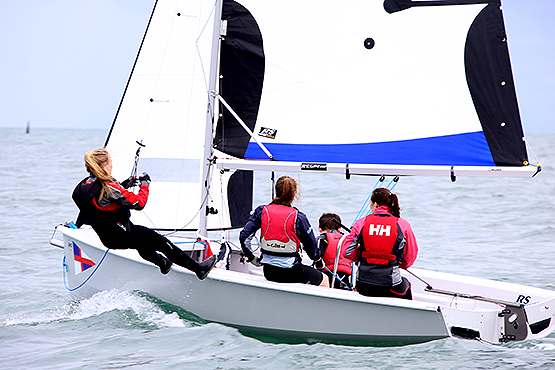#ISA - It's shaping up to be a year of big changes for trainees, tutors and coaches with the Irish Sailing Association as the organisation evolves to meet the demands of 21st–century sailing.
After taking on board feedback from the training review that formed part of last year's five-year strategic plan, 2016 will see a number of new initiatives introduced – and trainee sailors will be among the first to see the benefits.
These improvements include the simplification of the Small Boat Sailing Scheme, and changes to instructor endorsements to better differentiate between training for specific skills and holistic coaching, as well as putting greater focus on gaining skills and logging time on the water rather than trainees simply collecting certificates.
One of the biggest shifts internally in the association is the introduction of new technological solutions to reduce administration time and associated costs to training centres throughout Ireland.
And for the ISA's current crop of trainee sailors, the public face of that will be the new 'Sailing Passport' scheme.
Essentially an online, cloud-based logbook – accessible from computers, tablets and smartphones anywhere there's an internet connection – the Sailing Passport will replace existing paper-based methods of recording on-the-water activities and achievements.
Whether racing, cruising or just having fun, trainees will be able to record their sailing activities in a format that allows them and their instructors to easily track their progress in acquiring and developing the skills needed for any particular course or module.
Trainees in the Small Boat Sailing Scheme will be the first to benefit from this initiative before it's rolled out to power boating, windsurfing, cruising and other activities across the board.
Patrick Blaney has been leading the research and development of the Sailing Passport for the ISA and is co-ordinating its introduction in association with the association's Regional Development Officers.
As he explains, the passport is a response to the perception expressed in feedback to the ISA's Strategic Review Group that the association's training schemes were too focused on certification landmarks over individual sailors' development of skills.
"It's also part of the ISA development strategy to grow the levels of sailing activity outside of the traditional structured courses, particularly for young sailors," he says.
"The passport, as an online logbook, is designed to facilitate this by focussing on skills and experiences, not on certificates, and to do so in the 'modern' way – dispensing with paper logbooks that are easy to lose or damage, while also enabling training programmes be distributed to users more efficiently online."
Inspiration for the Sailing Passport comes from a similar system in use by Sail Canada for the last five years. That project was developed by former sailing instructors with digital and sports management knowhow, and has since been adopted by skiing chiefs and other sporting organisations in Canada.
The ISA's version is licensed from a sister programme called ChecKlick, and is already fully operational for the Small Boat Sailing Scheme, loaded with all the relevant Joe Soap Cards for skills development that student sailors will see checked off by their club or instructor as they progress, whenever or wherever they access their secure passport online.
But the system also allows individual sailors to add their own records for activities, goals and achievements as they track their training steps with greater accuracy, making for a more holistic approach to sail training over the previous 'gotta catch 'em all' collection of certificates.
The end result also serves as a kind of 'sailing CV', says Blaney, particularly useful for those working towards accreditation as a coach or instructor.
Trialing of the system has lead to some early positive feedback including this from Aengus Kennedy, principal of Rathmullan Sailing and Watersports School in Co Donegal:
"We started to use the ChecKlick system in 2015. The system is straightforward to use and the online tutorials work well as training manuals. Staff were up to speed quickly. Instructors have the opportunity to update each students progress throughout courses from their smartphones or devices which they embraced. Being able to print either certificates or a list of tasks achieved for each student at our leisure is a distinct advantage. Having a database of all students work and not paper logbooks is a big improvement."
The Sailing Passport will mean reduced costs for sailors and administrators alike, with access to the system costing €3 per participant.
With current paper log books costing €5 a pop, and certificates at €2 each, the savings will be significant over time, Blaney underlines.
Yet the costs are secondary to the vision of a more nimble, focused ISA that this project represents, something also reflected in the streamlining of the Small Boat Sailing Scheme itself.
That sees the revision of its upper-tier modules into a single level for each of three streams – Advanced Boat Handing; Start Racing; and Kites & Wires & Adventure – and the introduction of a new single Advanced Instructor Endorsement which will enable more and more clubs and training centres to acquire the resources necessary to offer the full suite of training modules.
What this all ultimately means for trainees is more choice and more flexibility in terms of where they can go to learn the skills they need, and what paths they can take to hone their preferences on the water, without being discouraged by the need for certification in skills that may block their advancement.
The coming year will reveal whether the ISA's first raft of changes will indeed encourage a brighter future for Ireland's young sailors.
A sailing passport briefing document prepared by the ISA is downloadable below.
































































